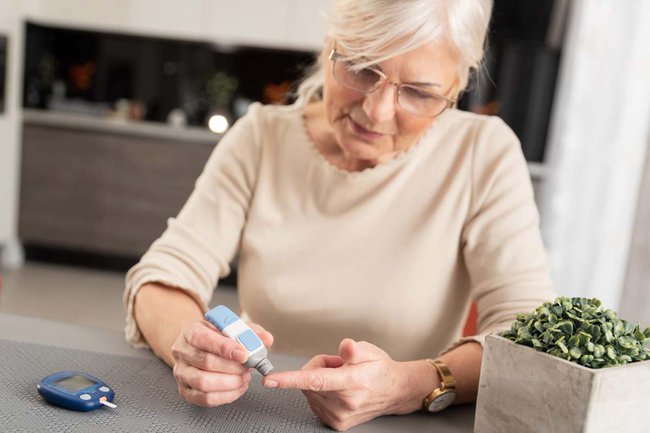World Diabetes Day: Access to Diabetes Care
An interdisciplinary study seeking to improve the support for type 2 diabetes patients through an messaging service is looking for test persons.

14 November is World Diabetes Day. This year, it is an opportunity to draw attention to the fact that not everyone affected by diabetes has access to good treatment and the necessary support. The project DiabPeerS aims to close this gap by examining whether people with type 2 diabetes can improve their health by supporting each other online.
Diabetes is one of the most widespread non-communicable diseases in the world. Approximately 800,000 people in Austria are suffering from type 2 diabetes, which is the most common variant of the disease. Left untreated, diabetes can lead to severe long-term complications such as cardiovascular and kidney diseases, lower quality of life, poorer physical health, and shorter life expectancy. For this reason, people with type 2 diabetes need continuous multi-professional care and support. Especially now during the COVID-19 pandemic type 2 diabetes patients are exposed to increased health risks: they would need more intensive care and assistance, which is often not possible due to the restrictions.
Online Support Independent of Time and Place
The St. Pölten University of Applied Sciences, the Karl Landsteiner University of Health Sciences, the University Hospital St. Pölten, and Österreichische Gesundheitskasse are currently conducting the research project DiabPeerS, which examines whether an instant messaging service can help people suffering from type 2 diabetes to deal better with their disease and, as a consequence, experience health benefits. The aim of the study is to develop a flexible and modern support offer for people with type 2 diabetes and to contribute to better care.
“On the occasion of this World Diabetes Day, our focus is on one of the world’s most frequent chronic diseases. The success of any diabetes therapy, however, strongly depends on the individual patient. After all, affected persons have to watch their lifestyle by keeping an adequate diet, taking the right drugs, measuring their blood glucose, and observing regular doctor’s appointments. The idea is that the exchange of experiences and mutual support between people sharing a similar life situation can help affected persons to deal better with their type 2 diabetes. In many cases, people find it easier to cope when they are backed by peers. Scientific studies have shown that this mutual support can have a positive effect on the course of the diabetes disease. This is where DiabPeerS comes in”, explains Elisabeth Höld from the Institute of Health Sciences at the St. Pölten UAS, who heads the project.
Test Persons Wanted – Apply Now!
More than 200 persons suffering from type 2 diabetes will be monitored over a period of 14 months for the study – one group with online peer support, the comparison group without.
The project team are still looking for participants who would like to exchange their experiences with other type 2 diabetes patients online. The test persons’ type 2 diabetes diagnosis should be no more than three years old, they should be taking oral antidiabetics, have a HbA1c of ≥ 6,5% (48 mmol / mol), be aged 40 or older, and should not be insulin-dependent yet. All participants should have a smartphone and be able to come either to the St. Pölten UAS or one of the university hospitals in Wiener Neustadt, Hollabrunn, or Mauer/Amstetten for their measurements. The test persons will receive an expense allowance of EUR 50 as well as their personal measurement results concerning body composition, abdominal girth, body weight and height, blood pressure, and selected blood parameters including a consultation thereof with a dietitian, and a small present from the Österreichische Gesundheitskasse.
“Treating the widespread disease that is diabetes is of central important for us at the Österreichische Gesundheitskasse: from early diagnosis to the ongoing treatment of affected persons, our services, programmes and regional projects provide comprehensive support”, emphasises Dr. Andreas Krauter, chief physician of the Österreichische Gesundheitskasse.
Application for the study
If you have any questions about the study or the conditions of participation, please contact us by e-mail at diabpeers@fhstp.ac.at or by telephone under the numbers +43 2742 313228-572 or +43 676 847228-572.
Project DiabPeerS
The project „DiabPeerS – Improving Glycemic Control in Patients with Type 2 Diabetes Mellitus through Peer Support Instant Messaging: A Randomized Controlled Trial” is financed by the Gesellschaft für Forschungsförderung Niederösterreich m.b.H and the provincial government of Lower Austria within the framework of the Life Science Call. The project is supported by the NÖ Landesgesundheitsagentur.
For further information, visit the project website at.
